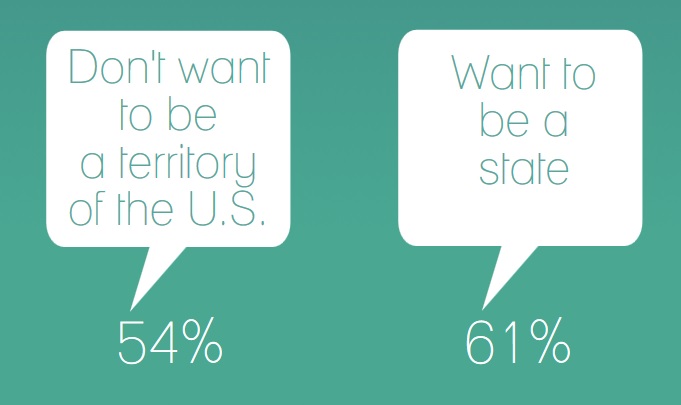John Oliver’s segment on voting rights in U.S. territories caught the attention of a lot of people across the nation.
Many were shocked that U.S. citizens in Puerto Rico couldn’t vote. Far too many were shocked that the people of Puerto Rico were citizens. Some discussed the complex issues thoughtfully and with reference to the insular cases and the 2012 referendum.
But many more seemed to be hurt that Puerto Rico didn’t want to be a state. Forums across the internet have comments like these:
- Why don’t they just become a state?
- They could be a state any time — they just have to apply.
- They don’t want to be a state. They voted against statehood.
- They like being a territory because they get all the benefits and none of the responsibilities.
- If they don’t want to be a state, we shouldn’t keep them!
Puerto Rico, in some of these conversations, has gone from an unincorporated territory to an uncommitted cousin who wants to be supported by the U.S. but refuses to become a state. Puerto Rico, in this story, likes the U.S. well enough to remain a territory, but just isn’t willing to fill out that statehood application.
Why buy the cow if you can have the milk for free, right?
This isn’t the reality of the situation.
Puerto Rico is a territory of the United States — an unincorporated territory, to be precise. The people of Puerto Rico have been U.S. citizens since 1917. As an unincorporated territory, Puerto Rico can become a state just as earlier territories did. As our posts on each state’s path to statehood have shown, every state has had its own unique experience becoming a state. Puerto Rico has been a territory for many years, but so have some of the other states.
However, in the 20th century, there were several votes on the status of Puerto Rico. An examination of those votes shows that the people of Puerto Rico have gradually begun to favor statehood. In 2012, a referendum on status showed a clear majority favoring statehood.
As an unincorporated territory, Puerto Rico pays taxes and is subject not only to the laws of the United States, but also to all decisions about it made by Congress. It gets less economic support than states, has fewer legal rights, and has no voting representation in the U.S. Congress. Does that sound like getting all the benefits and having none of the responsibilities?
Puerto Rico is ready to have all the benefits and all the responsibilities of statehood. But it isn’t just a matter of filling out an application.
A new, federally sponsored referendum has been funded for more than a year and Governor Garcia Padilla has said that he will hold that referendum this year. He must be reminded of this promise.
There are also bills in the U.S. Congress demanding action from Congress in support of this final referendum, and requiring action on the vote.
Tell your legislators what you expect of them. And when you have the chance to talk with others about the issue of Puerto Rico’s status, make sure that they understand the truth.









No responses yet